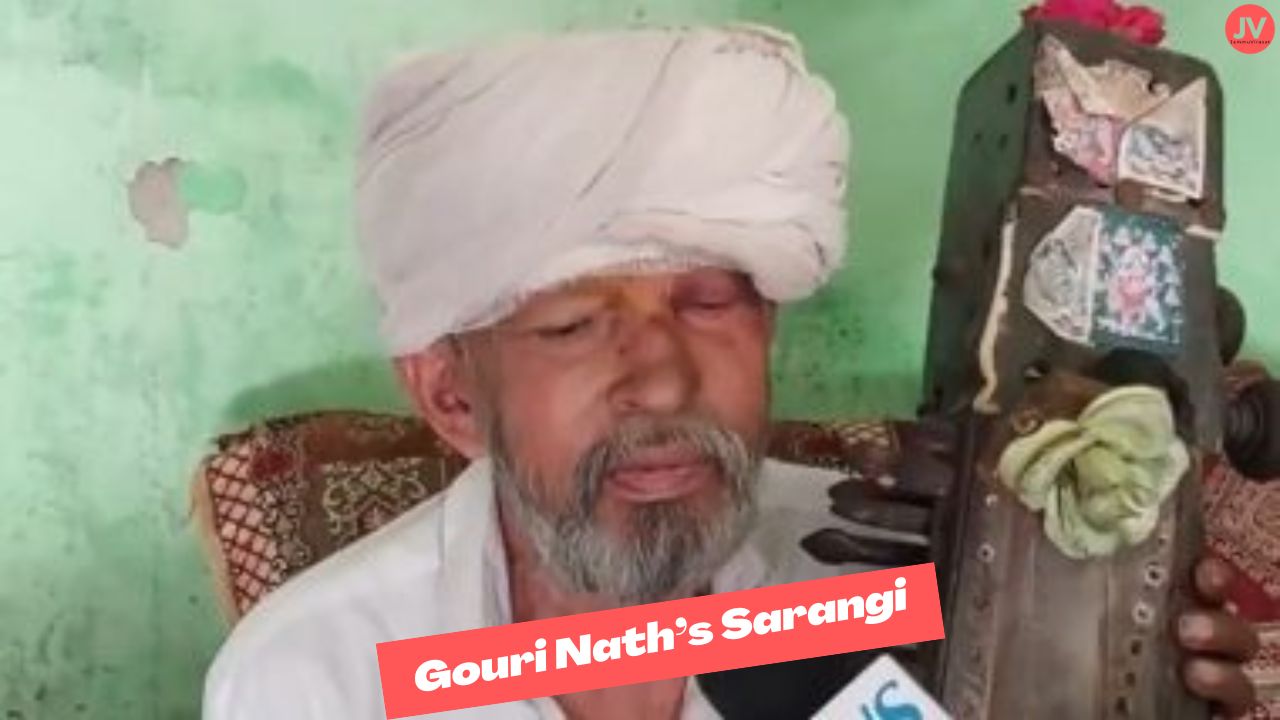Gouri Nath’s Sarangi of Udhampur recently gained special recognition in Prime Minister Narendra Modi’s popular monthly radio program, “Mann Ki Baat.” The Prime Minister highlighted Gouri Nath’s efforts to popularize and preserve the cultural heritage of the Dogra community through his mastery of the sarangi, a traditional string instrument that is over 100 years old. This acknowledgment marked the fulfillment of a lifelong dream for Gouri Nath, who has dedicated decades to keeping this unique aspect of Dogra culture alive.
The Legacy of Gouri Nath’s Sarangi
For Gouri Nath, the journey with the sarangi began at the tender age of 10 when he inherited the instrument from his grandfather. The sarangi, a treasured family instrument, has been passed down through generations, carrying not only the melodies of the past but also the stories and history of the Dogra people. Gouri Nath’s commitment to preserving this art form extends beyond music; it is a tribute to his ancestors, who also made a living by playing the sarangi.
Now, at 70 years old, Gouri Nath continues to play the century-old instrument, using its resonant tones to narrate ancient tales and historical events that form the bedrock of Dogra culture. His captivating performances offer a window into the past, allowing the younger generation to connect with the heritage that might otherwise fade away. The sarangi’s rich sound not only echoes in the valleys of Udhampur but also reaches beyond borders, touching hearts far and wide.
Read also: Folk Dances Of Jammu and Kashmir, List Of Traditional Dances
Prime Minister’s Acknowledgment: A Turning Point for Dogra Cultural Revival
During his address on “Mann Ki Baat,” Prime Minister Modi acknowledged the importance of individuals like Gouri Nath in safeguarding India’s diverse cultural heritage. He praised Gouri Nath’s dedication to using the sarangi to share the stories and traditions of the Dogra community, expressing how such efforts are crucial in keeping the cultural spirit alive across the nation. The Prime Minister also highlighted the significance of traditional art forms in connecting people and regions, drawing a parallel to the global resonance of Indian culture, which extends even to places like Yakutsk in Russia.
For Gouri Nath, the Prime Minister’s recognition was more than just an honor—it was a validation of his lifelong devotion to music and culture. It not only brought national attention to his work but also sparked a renewed interest in the sarangi among the youth, encouraging them to explore and appreciate their cultural roots.
A Family Tradition Spanning Generations
The Nath family’s association with the sarangi goes back several generations. Gouri Nath recalls how his grandfather and great-grandfather were also skilled sarangi players who earned their livelihood through music. The instrument was not merely a source of income; it was an integral part of their identity and community life. With each generation, the sarangi has been more than just a musical instrument—it has served as a custodian of culture, carrying the traditions, values, and stories of the Dogra people.
As Gouri Nath continues this family tradition, he sees himself not just as a musician but as a cultural ambassador. His performances are more than entertainment; they are a form of storytelling that breathes life into Dogra folklore and history. The sarangi’s hauntingly beautiful melodies resonate with listeners, evoking a sense of nostalgia for the old ways while inspiring a commitment to cultural preservation.
Keeping the Art Alive: Gouri Nath’s Mission for the Future
With the spotlight now on him, Gouri Nath is eager to use this opportunity to ensure that the legacy of the sarangi does not end with his generation. He is passionate about teaching the younger generation how to play the instrument, passing on not just the skills but also the cultural significance that accompanies it. He envisions a future where young people from Udhampur and beyond embrace the sarangi, not only as a musical instrument but as a symbol of their heritage.
Gouri Nath believes that by involving young people in music education, they can develop a deeper appreciation for their cultural roots and learn to value traditional art forms.
The Sarangi: More Than Just an Instrument
The sarangi, with its unique tonal qualities, has a distinctive place in folk music traditions across India. For the Dogra community, it holds special significance as it has been used for centuries to accompany local folk songs, dances, and rituals. The instrument’s deep, resonant sound is particularly suited to expressing the emotions and narratives embedded in Dogra folklore. Gouri Nath’s skillful playing brings out the full range of the sarangi’s voice, from mournful laments to joyful celebrations, making each performance a poignant reminder of the community’s cultural richness.
Read also: The Dogra trumpet – KAEL
Moreover, Gouri Nath’s efforts to preserve the sarangi and Dogra culture have broader implications for cultural preservation efforts across India. His story serves as an inspiration to other artists and cultural practitioners who are dedicated to keeping traditional art forms alive despite the challenges posed by modern lifestyles and shifting cultural values.
As Gouri Nath works to pass on his skills to the younger generation, there is hope that the melodies of the sarangi will continue to resonate in Udhampur and beyond for years to come.
The inspiring journey of Gouri Nath and his century-old sarangi symbolizes the resilience of traditional art forms in the face of changing times. His dedication to preserving Dogra culture, fueled by a deep connection to his ancestral roots, serves as a powerful reminder that cultural heritage is not a relic of the past but a living, breathing legacy that deserves to be cherished and sustained. As he continues to teach and perform, Gouri Nath is not just keeping the sarangi tradition alive; he is ensuring that the cultural echoes of Dogra heritage will continue to inspire future generations.
















